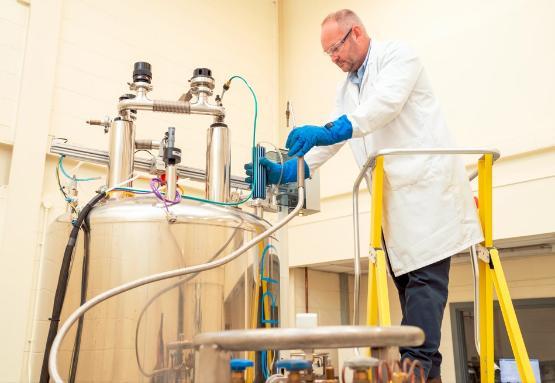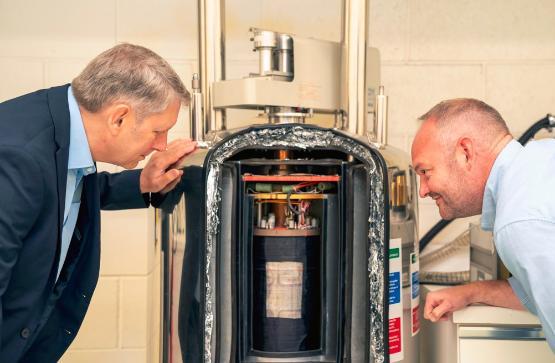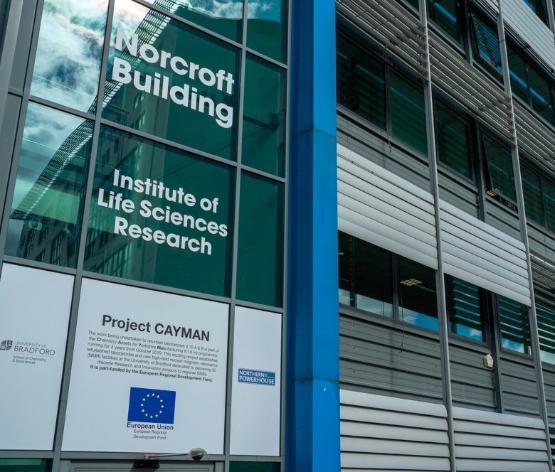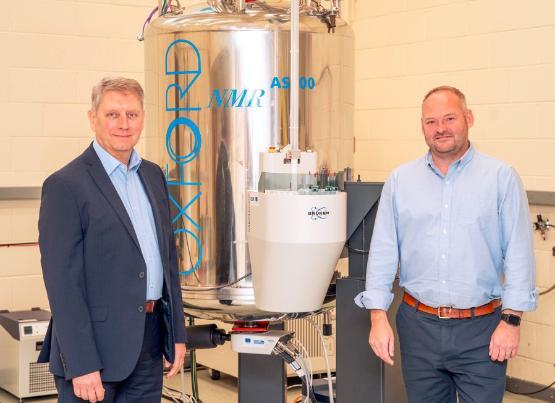Science powers SMEs, thanks to University of Bradford’s Project CAYMAN
A four-year project designed to give small and medium-sized businesses (SMEs) access to some of the world’s most advanced scientific analysis has been declared a major success by academics.

Project CAYMAN (Chemistry Assets for Yorkshire Manufacturing) began as a three-year initiative funded by £1.6m from European Regional Development Fund, with half that cost matched by the University of Bradford. It was extended a further nine months based on its phenomenal success.
In the last four years, it has helped 65 SMEs gain access to highly technical scientific analysis of materials that would otherwise be unavailable to them. The team from the University uses a nuclear magnetic resonance (NMR) spectroscopy to examine the molecular structure of different materials.

The NMR contains a super-conducting magnet, which is super cooled to just four degrees above absolute zero (around minus-269 Celsius).
Many of those SMEs are using the analysis to develop new products, which in turn has the potential to create jobs in the region (see the case studies below).
Dr Richard Telford, Associate Professor in the Faculty of Life Sciences, who is Director of the Centre for Chemical and Biological Analysis, said: “Project CAYMAN has provided an excellent means for the University of Bradford to engage with regional SMEs and given us the opportunity to showcase not only our facilities and expertise, but convey how high-level analytical science can be of benefit to developing industrial processes.”
He added: “Project CAYMAN successfully met all its ERDF output targets, which, considering a large part of this project was conducted under COVID restrictions, was a major achievement. The success has demonstrated the University's capability to deliver regeneration projects and will provide a great platform to do so again.”
Project CAYMAN was designed by academics at the UoB’s Centre for Chemical and Biological Analysis to give Leeds City Region SMEs access to analytical chemistry expertise and facilities, focusing on a technique known as Nuclear Magnetic Resonance (NMR) spectroscopy - an analytical chemistry technique used in quality control and research for determining the content and purity of a sample as well as its molecular structure.

CAYMAN’s academic technical team, business professionals and finance colleagues successfully addressed the challenge of transferring this sophisticated technology into the environment of regional SMEs. CAYMAN’s primary objective was to accelerate business growth in the high-density of chemistry using companies in the Leeds City Region.
Of the 65 SMEs helped during the 45-month programme, 18 gained a measurable impact, enabling a new product/process to be developed, and 12 companies have ongoing commercial relationships with the University of Bradford.
The CAYMAN team was awarded the University of Bradford Outstanding Contribution to Knowledge Exchange award in February 2023.
The CAYMAN team received very positive feedback from its clients, including 7 Case Studies.
Professor Steve Rimmer, who initiated the project, said: “Accessing this kind of technology is difficult for SMEs and CAYMAN has enabled us to break that barrier. Many of the projects have contributed to new products and/or processes and led to lasting relationships between University and the SME.”
Dr Jason Jones (pictured below/left), Commercial Manager in the Faculty of Life Sciences, who led the business development and client interactions, said they were hoping to extend the concept under a new programme.

He said: “Since its launch event in 2019 CAYMAN has established an excellent track record for the University to deliver this type of regeneration project, which has always been challenging.”
The project has been used as evidence in a bid to the UK Shared Prosperity Fund (UKSPF) for similar matched funding for a programme known as SIBLING (Scientific Instrumentation for Business Leadership in Innovation and Growth), which is asking for £1.9m in matched funding (60% from UKSPF) for the purchase of new instrumentation and equipment across the University.
If successful, the project will continue the University’s delivery of innovative projects to regional SMEs using complex analytical instrumentation and manufacturing equipment.
